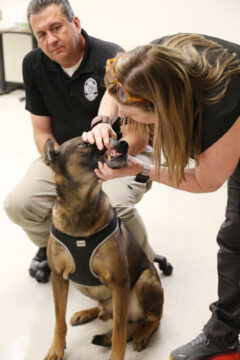The dog days of summer are no less kind to canines than they are to humans. For working dogs like the K9 officers assigned to the University of Georgia Police Department, they can be deadly.
Helping K9 handlers recognize and treat the signs of heat stress and other maladies is the mission of Anna Santos, a veterinary nurse who worked 25 years at the Veterinary Teaching Hospital and still partners with the VTH from her new position with the UGA Office of Research.
Santos, who is pursuing a master’s degree in public health through the Institute for Disaster Management, is partnering with UGA Police to develop a basic first aid course for K9 handlers. Her first iteration of the course, held at the university, drew the participation of a K9 officer and his handler from Georgia Gwinnett College and agents of the Federal Bureau of Investigation who are also certified as emergency medical responders for humans. Santos said the FBI was keen to participate because they had been on scene with injured animals in the past and were unable to help.
“The goal of this whole workshop is to give them information that is going to save the dog’s life in an emergent situation so they can get back to work,” Santos said.

Buddy, a Labrador Retriever trained to sniff out explosives, gets a pulse-check from his human handler. Both officers are employed by Georgia Gwinnett College.
While Santos addressed urgent care topics such as bandaging wounds and stabilizing an animal for transport to a veterinarian, she said the most useful lesson of the course is teaching handlers how their dogs look and act when they’re healthy. Core body temperature, gum color, breathing patterns, heart rate and gait change when a dog is overheated, exhausted, injured, or sick.
Just as the owners of dogs and cats take advantage of advancements in veterinary health to improve and prolong the lives of their pets, K9 handlers are doing the same.
“I think in the U.S. there has been a notable increase in public awareness of law enforcement and military working dogs, where people genuinely acknowledge that dogs are our partners,” said Dan Silk, associate vice president for public safety at UGA. “With that comes additional responsibilities to look after them. You would expect a police officer to be able to provide emergency medical care for their human partner, so an understanding has to be developed that we need to be able to provide that emergency medical care for our canine partners as well.”
The UGA Police Department welcomed bomb-sniffing K9 officers into its ranks after the Centennial Olympic Games concluded in Georgia in the summer of 1996. Retired UGA Police Chief Chuck Horton said the Centennial Park bombing in Atlanta and various threats made against Olympic venues in Athens and elsewhere in Northeast Georgia crystallized the need for a specially trained team based in Athens.

Anna Santos shows a UGA Police Officer how to check the gum color of Jack, his Belgian Malinois partner.
Horton and his team answered so many reports of suspicious bags left unattended at venues that he vowed at the time, “If I ever get out of this alive, I’m going to start an EOD (Explosive Ordinance Disposal) team.”
Cobbling together resources to organize that first team with two dogs, Horton said he found great support from the College of Veterinary Medicine where his wife, Brenda, worked in administration at the time.
“Both dogs had the best medical care,” Horton said. “They had people checking on them all the time.”
To this day, UGA is one of very few universities nationwide that maintains a bomb detection and disposal unit. The team – which includes four Belgian Malinois K9s and four human officers – operates under aid agreements with federal and state agencies to respond to bomb threats throughout Northeast Georgia, helping smaller police departments that lack the financial resources to maintain their own EOD teams.

